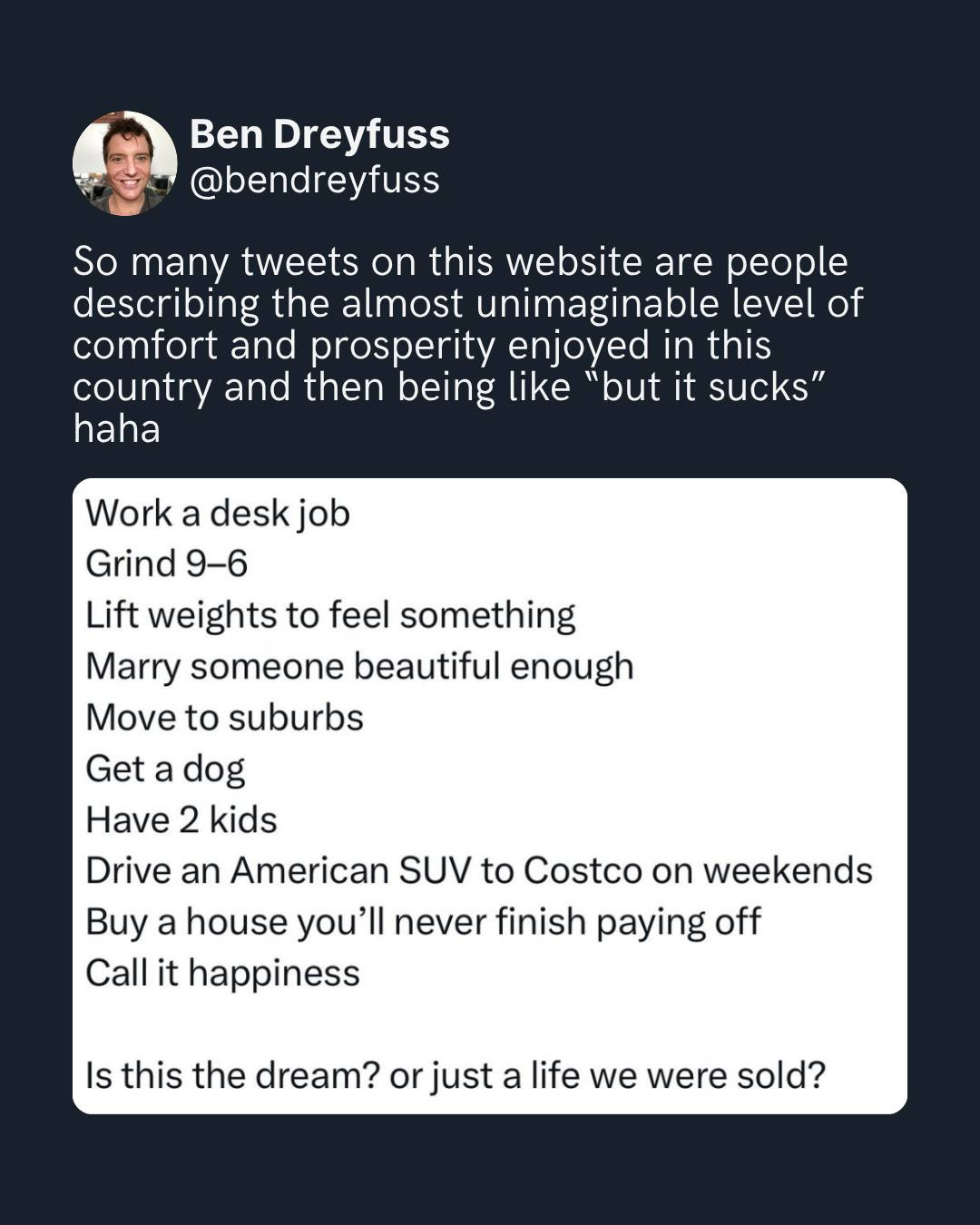Human nature is a fickle master. Sometimes it drives us to achieve, and in doing so can improve the lot of others. Sometimes it drives us to destroy, and in doing so harms others. Both those drives come from the same place: we want more than we have.
This is entirely natural and reinforced across millennia of evolution. Those who want more are more apt to pass down their DNA.
Some philosophies and religions seek to teach us not to want more, but instead to want less. They see that wanting more makes some people unhappy, so they teach that this part of human nature is a bad thing.
I believe the problem lies not in the desire, but in the expectation. Like any other human proclivity, it can be managed well or it can be managed poorly. Our desire to eat high calorie foods - we are wired to find them delicious - can in this time of abundance do us great harm if we don't manage it. Enjoy a delicious meal from time to time will make you happy. Gorge every day and you will end up miserable.
Ponder that abundance. We live in an era of unprecedented human comfort. Every year, the fraction of the world's population living in extreme poverty or at subsistence level diminishes. The biggest risks to our health are no longer environmental. Heart disease, overwhelmingly a product of lifestyle, is the leading cause of death in the US. The poorest in the West enjoy comforts that wealthy people of two centuries ago could not imagine.
All this makes us forget that the baseline human condition is misery. That across most of the hundred thousand years humans have existed, life itself was a daily struggle. That across most of the six thousand years of human civilization, each day was occupied with life-dependent concerns that are trivialities to us today.
This came to mind when this meme crossed my feed.
My response was that happiness is, for the vast majority of us, a choice. Yes, we need to work to put food on the table, clothes on our backs, and keep the weather at bay. It is part of the baseline human condition. We can choose to seethe at this reality and wallow in misery, or we can accept that it's part of our individual responsibility to this thing we call life and not seethe at the supposed indignity.
That choice is impeded by another element of human nature: energy conservation. When food was something you had to work at getting, when daily sustenance was in doubt, the proclivity not to burn calories unnecessarily was wired into our genes. So, yes, we are inclined to choose the easier path in all things, and this invites those who would profit by leveraging that inclination.
We are surrounded by people who tell us that this thing called "work" is a misery we can avoid if we do as they say and give them what they seek (i.e. money and power). It's why socialism is so appealing to the young, who have had less time to develop mastery over their base motivations. Social media has amplified this, with "influencers" pitching a "better than yours" lifestyle that feeds on your "want more" instinct.
The irony in all this? The influencers make themselves happier by making you less happy.
Yes, we can desire more than we have. This doesn't mean we have to be unhappy with what we have, or at our current level of lifestyle. Very few of us work "hard" in a historical sense. A couple hundred years ago, before the start of the Industrial Revolution, the vast majority of people in America worked physically demanding jobs. Today, even those physical jobs are greatly aided by technology. Lumberjacks use chain saws and other powered equipment rather than axes and hand saws to fell and harvest trees. I just watched a crew put a new roof on my neighbor's house. Physical work, yes, but a powered lift hoisted the shingles and nail guns drove the nails. And let's face it, most of us don't come anywhere close to today's most physically demanding jobs - jobs that themselves are easier than they were even half a century ago.
There's nothing wrong with physical jobs, by the way. I've blogged many times about the satisfaction of "doing," and many people find contentment in putting in a day on a construction site. The point is - we can find contentment in just about anything. Or, we can choose instead to complain about working, complain about our co-workers, complain about our bosses, complain about our commutes, complain about our pay, complain about our houses, our spouses, our kids, our friends, our neighbors, and our neighborhoods - and let all those complaints put us into a state of misery.
Sometimes, the complaints are warranted. This doesn't mean we must wallow in them or fixate on them. We can complain as a release, we can complain as a first step toward remedy, or we can complain and then get on with our lives. Even with complaints, we can say "you know what? My life is pretty good even though I work ten hours a day, my kid is an asshole and my dog shit the floor."
Yes, there are times when life ****s you over, and they suck, and no one will fault you for responding with grief or sadness or anger. That's not what I'm talking about. For most of us, most of the time, happiness is a choice. So is misery.
Choose wisely.
Worth mentioning are a recent study that found liberal women are more likely to be unhappy than conservative women and analysis that finds liberals today are more than twice as likely to have poor mental health.
This suggests that the modern leftist narrative is at odds with human nature, and is selling an unhealthy and counterproductive story to the public. That story? That your life is the result of others' deeds, not your own. That you are being "done unto" rather than having the power and agency to pursue your own happiness. That things are invariably someone else's fault, and that the only remedy is using force to take what others have.
I paraphrase Greg Gutfeld in describing these unhappy people:
Loud, resentful, and spoiled by the culture they hate.
Indeed a recipe for misery.
Lastly, a bit I just ran on my other blog.






My wife and I and two boys did well enough on half - HALF - a military paycheck, dedicating every other raise or promotion to investments, and every other to quality of life, over 30 years. We never bought things we couldn't afford to pay cash for, except our Forever House, which we did pay off at age 57 from the mountain of taxable investments we'd built over 30 years of saving and budgeting. Yes, others we knew "lived better" than we did at the time, but my focus was on being the best I could be at my job and let everything else sort itself out - and it did.
"Workers of the world, unite! All you have to lose are your chains." - Marx
"It is only by the force of the state that the liberty of its members can be secured." - Rousseau
If miserable liberals ever get the "freedom" that Leftists are selling, grinding a desk job and driving to Costco with your wife and kids on the weekends will be remembered as Paradise Lost.
"The mind is its own place, and in itself
Can make a Heaven of Hell, a Hell of Heaven."
- John Milton